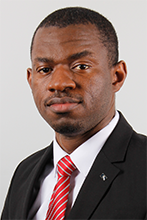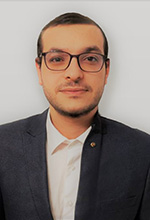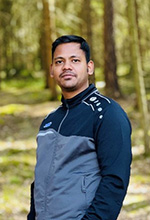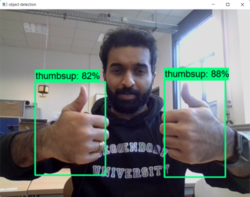Chiemezie Albert Udoh
2020 | Mechatronics and Cyber-Physical Systems (in Cham)

Beruflicher Werdegang
Ich arbeite derzeit in der Elektronik- und Mechatronik-Herstellungsindustrie als Testingenieur, nachdem ich aus der Öl- und Gasindustrie als Bauingenieur gewechselt habe.
Mein Ziel ist es, ein Profi im Bereich Embedded System (Soft- und Hardware) zu werden. Ich glaube, dass ich mit dem Studium Mechatronics and Cyber-Physical Systems an der TH Deggendorf das Fundament für diesen Bereich gelegt habe.
Schwelgen erlaubt: Erinnern Sie sich an Ihre Studentenzeit
Die Erinnerung an die erste Weihnachtsfeier auf dem Campus wird mir immer im Gedächtnis bleiben. Sie war so freundlich und einladend, wenn man bedenkt, dass ich gerade erst in Deutschland angekommen war. Ich war extrem aufgeregt mit Menschen aus verschiedenen Kulturen zu interagieren und neue Freunde zu finden.
Ich denke auch, dass die Lernatmosphäre ziemlich einzigartig war, weil ich keine Spannungen zwischen den Studierenden/Professor:innen Beziehungen bemerkt habe. Ich hatte das Gefühl, dass ich jedes Mal, wenn ich die Vorlesungen besucht habe, von einem Freund gelernt habe. Die Aufgeschlossenheit der Professor:innen machten die Kunst des Lernens noch erstrebenswerter.
Ich hatte meine erste spannende Hackathon Erfahrung im März 2019 (Moving Station Pilsen) mit meinen Kolleg:innen, die mir aktuelle Trends in den Mechatronik-bezogenen Technologien näher gebracht haben, und ich möchte mich bei der Hochschule für diese Möglichkeit bedanken, da ich auf dem Gebiet der Mechatronik neu war.
Was möchten Sie den aktuellen Studierenden mit auf den Weg geben?
Ich habe gelernt, dass man sich als Student:in sehr anstrengen muss, um Kompetenz in jedem Wissensgebiet zu erlangen. Die Professor:innen werden zwar immer Anleitung und Hilfe geben, aber man muss erkennen, dass wir die Haupttreibenden sind, um Lösungen für die Konzepte zu finden, die uns interessieren.
Fühlen Sie sich frei auf Ihre Kommiliton:innen zuzugehen und seien Sie bereit Ihr Wissen mit anderen zu teilen, die danach suchen.
Ich habe sehr von den Tutorien profitiert, die mein Kommilitone organisiert hat und zwar auf verschiedene Arten, die ein tieferes Verständnis, mehr Zeit für Fragen und Nachfragen ermöglicht haben. Daher empfehle ich nachdrücklich, dass Tutorien Lernhilfen sind und nicht als Ersatz für den Besuch von Vorlesungen angesehen werden sollten.
Abschließend rate ich Ihnen offen zu sein und alles so einfach wie mögich zu halten. Nehmen Sie Kritik an, denn das wird den Raum für Entwicklung öffnen und die Bereitschaft stärken, Dinge unabhängig vom erwarteten Ergebnis auszuprobieren.


















